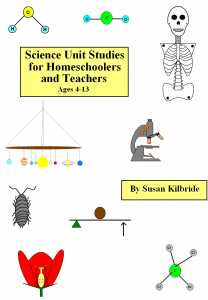 Susan Kilbride’s Fantastic Unit Studies is a website offering Science & History unit studies, along with recommendations for books and resources for homeschoolers. For this review, I was given a copy of Science Unit Studies for Homeschoolers and Teachers, a 201-page softcover book that is full of a variety of hands-on science activities for children ages 4-13. The topics are split into two age groups, with half of the units for ages 4-7 and half of the units for ages 8-13.
Susan Kilbride’s Fantastic Unit Studies is a website offering Science & History unit studies, along with recommendations for books and resources for homeschoolers. For this review, I was given a copy of Science Unit Studies for Homeschoolers and Teachers, a 201-page softcover book that is full of a variety of hands-on science activities for children ages 4-13. The topics are split into two age groups, with half of the units for ages 4-7 and half of the units for ages 8-13.
The following units are geared to ages 4-7:
- Our Senses
- The Human Body
- Dinosaurs and Prehistoric Life
- Animals
- Insects and Their Kin
- Fun with Magnets
- Stars and Planets
- Health
- Beginning Plants
- Animal Ecology
These units are for ages 8-13, and include more in-depth activities as well as tests:
- Insects
- Microscopes and Invisible Creatures
- Atoms and Molecules
- Matter
- Chemistry Fun
- Weather
- Force and Motion
- Simple Machines
- Light and Color
- Plants II
The units all start with a list of materials you will need to complete the study. At first, I was overwhelmed by these lists, but as I read through them, I realized that MOST of the items should be readily on-hand in most homes. Some things you’ll need to buy, but it just depends on how extensive your arts/crafts and kitchen supplies are. 🙂
After the needed materials list in each unit, you go into an introduction (sometimes), and then you are presented with several different sub-topics and activities to work through. Every unit is different. Some include more kinesthetic-type activities than others. For example, in the “Our Senses” unit, students build a Mr. Potato Head type craft, using an actual potato, toothpicks, and vegetables. This gives a good visual to help them remember where their eyes, ears, nose, and mouth are. Another activity in that particular unit is to read Goldilocks and the Three Bears, asking students to call out when each of the five senses are used. The activities for the younger kids are more activity-based, lighter on the academics. The older kids explore more of the details about the WHY and the HOW of the activities.
The program is VERY self-explanatory. Other than collecting materials, there is not a lot of prep work, which can be the case in some unit study curricula.
This book is great for homeschoolers. It allows the teacher freedom to explore the topics in whatever way works best for the kids. In my opinion, it’s best suited for families who are just getting an overview of various science topics before diving into whatever areas interest is found. The activities are fun, varied, and get the kids excited about science!
If you are interested in trying out Science Unit Studies for Homeschoolers and Teachers, check out the free Science units that Susan offers. You can download a PDF of Atoms & Molecules and/or Plants. The Table of Contents is also included in each PDF so you can get an overall picture of the studies included. Along with these free Science units, Susan also offers unit studies for History. You can look at all of her free lessons here: Free Units. On her site, you’ll also find a lot of reading resources for younger children and other resources that she recommends.
About Susan Kilbride:
Susan Kilbride is a homeschooling mother with a degree in biology. A few years ago she noticed that many homeschooling parents are either uncomfortable teaching their children science, or just don’t have the time to do the necessary research to teach their children science. Susan wrote Science Unit Studies for Homeschoolers and Teachers with these parents in mind, using the same methods that she used when teaching her own son. Since then, Susan has started the “Our America” history series–chapter books designed to teach American history by telling the stories of the people who lived it. She has also written a Kindle eBook titled “How to Teach About Electricity for Ages 8-13.”



Leave a reply